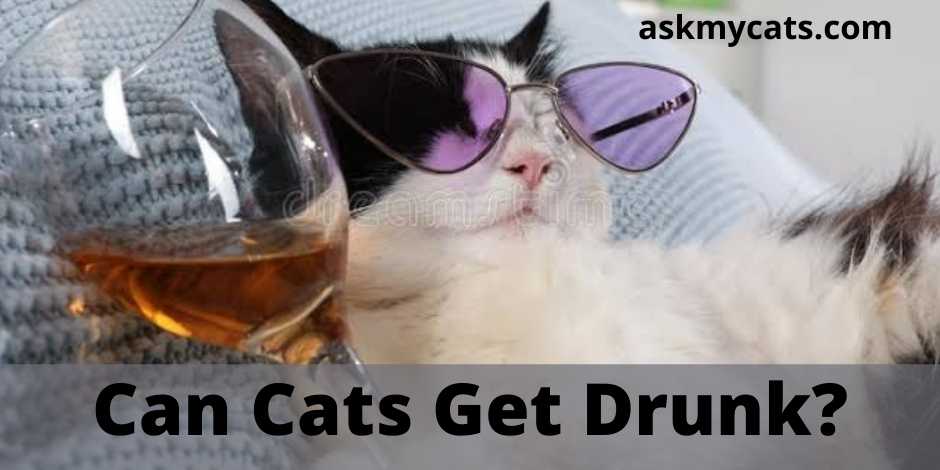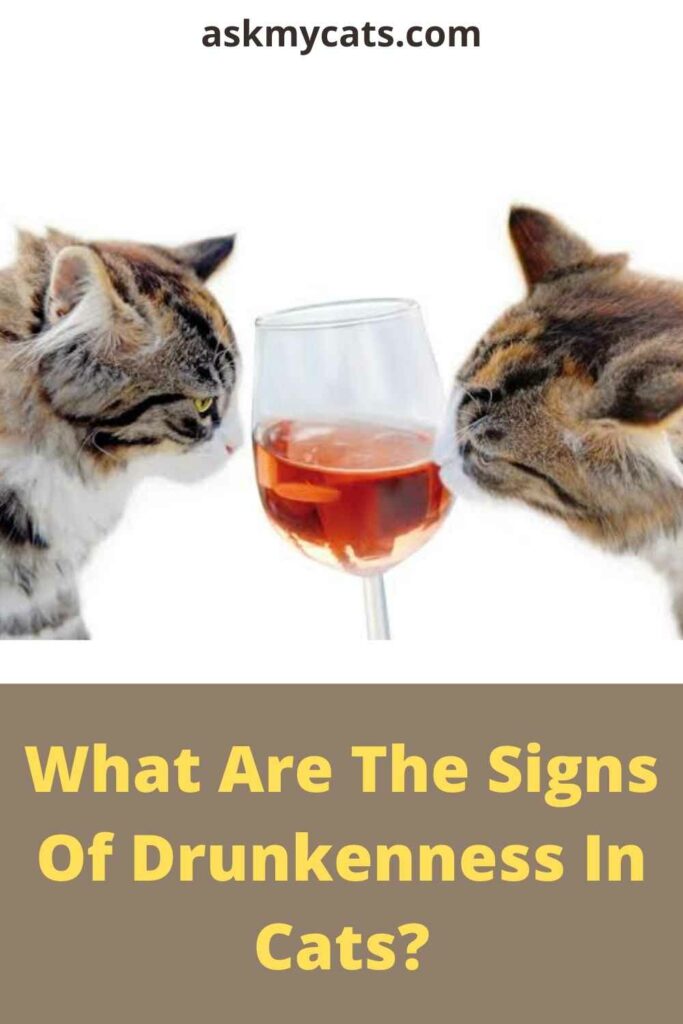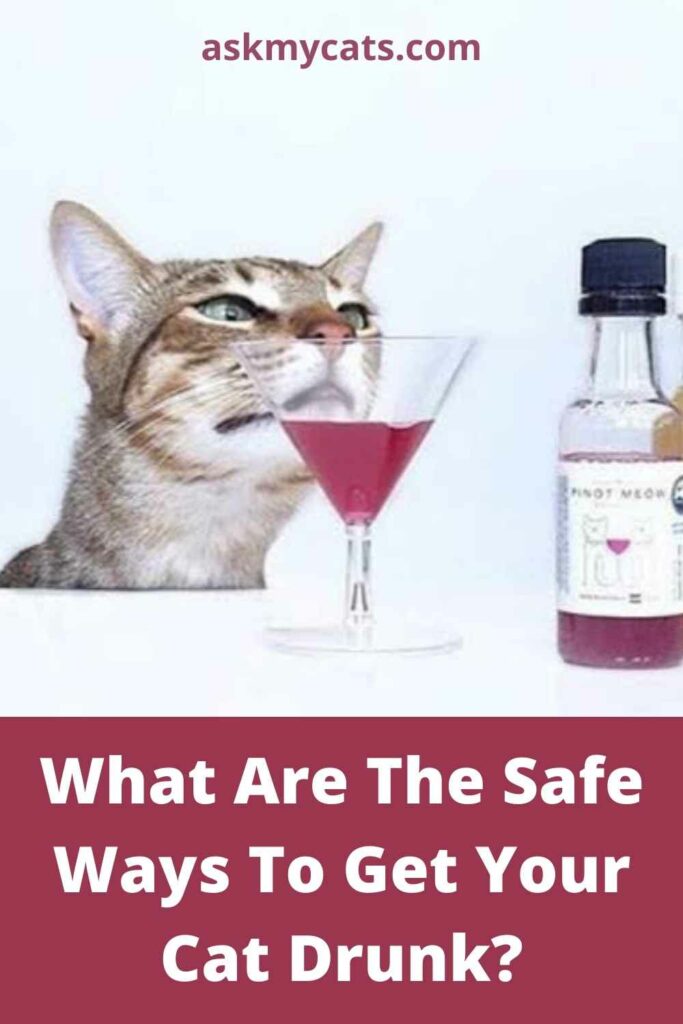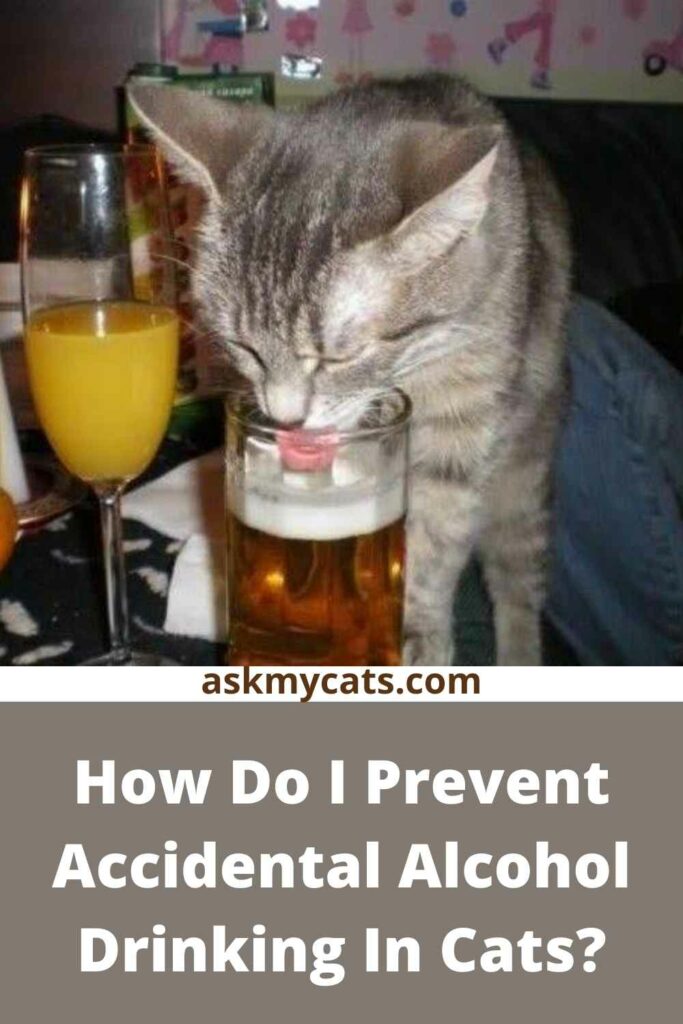Yes, cats can get drunk. They have a very low tolerance for alcohol. Just a few sips can make your feline friend drunk without you even realising it.
Cats should never drink alcohol since it is highly harmful to them and can cause ethanol poisoning, which can be deadly.
Even one tablespoon of alcoholic drink can induce severe liver damage and nervous system depression, which can lead to catastrophic brain damage.
Alcohol poisoning in cats is uncommon since cats dislike the taste and smell of alcohol.
Alcohol poisoning is most frequently induced by a cat eating or drinking something he or she like that contains alcohol, such as a creamy cocktail.
If you want to learn more about the effects of alcohol on your feline, keep reading!


Give Your Cat the Perfect Day
Get the Free Ebook!
What Happens If You Give Cats Alcohol?
It depends on how much alcohol the cat has consumed, when it last ate, and its general metabolism.
The most frequent response to alcohol in cats is a behavioral change. This usually results in the cat being either agitated or sleepy.
However, the long-term effects of alcohol consumption go beyond merely a shift in habit.
Alcohol, even in trace amounts, can cause:
- Consciousness loss
- Failure of the kidneys
- Failure of the liver
- Acidosis metabolique (too much acid)
- Difficulties with the lungs
- Death
Small quantities of soft or hard liquor might cause serious health problems for your fluffy buddy. Ethanol toxicosis is the medical name for what occurs to your cat.
This is more commonly known as ethanol poisoning. It can be fatal if left untreated, regardless of the breed or age of your pet.
Can Cats Get Drunk On Alcohol?
Yes, cats can get drunk on alcohol. Ethanol poisoning can be caused by alcoholic drinks as well as alcohol-infused items such as perfume, mouthwash, medicine, and cleaning supplies.
Attempting to provide water to your pet to avoid dehydration and further harm will be ineffective. Because cats do not have a strong inborn feeling of dehydration, they will most likely refuse to drink.
You also can’t just wait it out and hope that the adverse effects would go away. We recommend that you contact your veterinarian if your pet begins to show signs of ethanol toxicity.
How Bad Is Alcohol For Cats?
Alcohol is harmful to many household animals, including cats. The central nervous system can be depressed as a result of ethanol poisoning.
The animal becomes sleepy and clumsy, eventually losing consciousness, succumbing to respiratory failure, and maybe dying.
Alcohol is extremely harmful to cats and dogs. Animals suffering from alcohol poisoning may experience diarrhoea, vomiting, depression, lack of coordination, difficulty breathing, unconsciousness, convulsions, or even death.
Alcohol intake in cats causes it to circulate throughout the body without decomposition, inhibiting bodily functions. That is only one side of the tale.
When cats consume alcohol, their body temperature lowers dramatically. Their blood chemistry is also changed, resulting in metabolic acidosis, a hazardous condition in which their blood becomes hyper-acidic.
Death is imminent at this stage, especially if the cause is a heart attack. Even if the cat does not succumb to the consequences of ethanol intoxication, the toxicity may be detrimental.
Toxins damage the cat’s liver and kidneys, lowering the animal’s quality of life.
As a result, feeding alcohol to your cat, even on a rare occasion, is not a joke. It might damage your pet permanently or result in an early death.
How Much Alcohol Can A Cat Have?
Even a tiny amount of alcohol might have serious consequences for your cat’s health.
Ethanol poisoning is the medical name for the state of a cat who has consumed alcohol. This disease, regardless of the cat’s breed or age, is fatal if left untreated.
Cats are unable to consume alcohol. Their systems are devoid of enzymes capable of breaking down consumed alcohol.
As a result, the alcohol flows throughout their systems without causing harm to the cats due to detoxification.
A five pound cat may be put into a coma with just a teaspoon or two of alcohol. The more alcohol consumed, the more serious the case and the worse the symptoms get.
How Do Cats Act When Drunk?
In humans, the symptoms look a lot like intoxication or seasickness. Your cat may trip, struggle to stand on all four feet, or wobble back and forth when walking.
You could see her head tilting to one side and her eyes flashing back and forth in her head. It’s also possible that your cat will vomit.
If you’re not sure what’s wrong, it’s probable that your cat’s vestibular system is malfunctioning.
The feline vestibular system is essentially her brain’s balance centre. She’ll get dizzy, disoriented, and have problems with muscular coordination if something goes wrong in this intricate network of neurons and synapses.
What Are The Signs Of Drunkenness In Cats?

After a cat consumes alcohol, the symptoms of ethanol poisoning generally appear 30 minutes later.
The cat seems extremely eager, perplexed, and maybe staggering. The symptoms might vary based on a variety of variables.
This covers the quantity of alcohol consumed, the time since the alcohol was consumed, and the cat’s general metabolism. Alcohol use in cats typically results in more than simply short-term behavioural alterations.
If your cat has consumed alcohol, it is critical that you keep an eye out for symptoms that they may be suffering from alcohol poisoning.
The alcohol is still in the cat’s system. Because it doesn’t have any antidotes, it causes severe poisoning.
The signs and symptoms of ethanol poisoning in cats is a serious problem.
Slow reflexes, weakness, and urination are all signs of ethanol intoxication in cats, and they are quite similar to those of a drunk human.
The following are signs that your cat is drunk:
- They would be shaky on their feet
- Vomiting
- Confusion
- Lethargy
- Drowsiness
- Slow reaction times
More severe effects may appear 20 minutes or so after ingesting the alcohol, including:
- Urination that is excessive
- Excessive thirst
- Slow heart rate
- Breathing is shallow.
- Seizures
- Shaking
- Unconsciousness
- Paralysis
If you observe any of these symptoms, take your cat to the doctor right away since alcohol poisoning can be fatal.
In general, all symptoms of ethanol intoxication in cats are related to the amount of alcohol consumed in relation to body weight.
Even if the alcohol intake was minor, the symptoms should not be overlooked. Calling or contacting an animal poison control centre or your local veterinarian should be done as soon as possible.
How Much Alcohol Kills A Cat?
Alcohol is harmful to your cat. Cats can not only become inebriated, but they can also suffer serious liver and brain damage.
An adult cat may be placed into a coma with as little as a tablespoon of any type of alcohol.
Their Central Nervous System could get depressed due to the ethanol in the drink.
Because the CNS is in charge of most of the brain’s and mind’s enjoyable activities, the CNS progressively shutting down may be highly hazardous, even deadly.
Ethanol intoxication can result in loss of consciousness, respiratory failure, and death.
What Are The Safe Ways To Get Your Cat Drunk?
These are some of the safe ways you can get your cat drunk:

1. Cat Wine
Cats cannot drink wine, therefore wine for cats is an excellent option if you want to have a glass with your feline companion.
Apollo Peak has created an alcohol-free catnip-based drink that is a safe alternative. Purssecco, Meowgarita, Meowtini, and more are among the ten wine varieties available.
You may select a lesser drink like the Pinot Meow or a stronger variety like the Meowmosa depending on how tolerant your cat is.
Regardless of the drink you pick, your cat will be entirely safe. The transient euphoria caused by cat wine will pass quickly and without causing them any harm.
2. Catnip
The similar effect may be achieved with a good dosage of catnip. Catnip is incredibly cheap, easy to get by, and effective on at least half of cats.
While some cats are unaffected by this natural herb, it causes many others to jump around and act erratically, much like they would if they were drunk.
Catnip lasts only a few minutes but is entirely harmless, and you can even cultivate it in your yard for fresh supply.
Catnip can be given to your cat in a variety of ways, including:
- Put some catnip on the floor or in their food to make them feel better.
- Purchase a catnip toy for your feline
- Make a catnip sock out of an old sock
3. Calming Pheromones
If you want to unwind after a long day but your cat prefers to run about, instead of offering them alcohol, consider applying a soothing pheromone to quiet them down.
Most pheromones are plug-ins, but some are sprays that you may spray anywhere you need them. While some cats are unaffected by pheromones, they will benefit the majority of cats.
Some products can help cats get along or stop clawing furniture, and they’re totally safe to use around your pet, but you shouldn’t spray it on them directly.
What Do I Do If My Cat Has Drunk Too Much Alcohol?
When speaking with the veterinarian, be as specific as possible. Tell the doctor what kind of alcohol the cat consumed, where it came from, how much it consumed, and so on.
Don’t forget to mention any medical conditions or drugs your cat is on.
Additional blood tests will be performed by the veterinarian. They’ll look at your pet’s blood to see how acidic it is and how much alcohol is in it.
The doctor will next determine whether your cat requires mechanical breathing (oxygen masks), intravenous fluids for rehydration, cardiac treatment, or medicines to reduce ethanol levels and repair organ damage.
Keep all drinks, paints, mouthwashes, and other similar items out of reach of pets at all times to avoid potential problems with alcohol.
Make sure everything is secure since you never know when your pet will get curious or where it may seek refuge the next time you turn your back.
How Do I Prevent Accidental Alcohol Drinking In Cats?

Keeping ethanol-containing items away from cats is the most effective approach to keep your cat from unintentionally drinking alcohol. Especially because it’s quite feasible for your cat to consume alcohol without it being poured into his or her water dish.
To make matters worse, your cat may become inebriated without your knowledge. As a result, you must keep a close eye on your pet, especially during celebrations when alcohol spills are prevalent.
Cats are inquisitive animals, and their constant search for tasty objects may result in ethanol poisoning. Disposing of leftover beverages is another method pet parents may make it more difficult for their cats to drink alcohol.
Food and alcohol-containing products should also be kept out of reach of cats. Kits for homebrewing should be properly packed and kept away from animals.
Remember to keep the bottle securely locked when drinking alcohol in the presence of a cat.
Cats are fascinated by what their humans eat and drink, and can get ethanol poisoned as a result. When drinking alcohol, it’s also necessary to have a nearby piece of cloth or towel to clean any spillage.
Your cat could have lapped up the spilt booze in the time it took you to get a towel.
Finally, it is critical to be informed of local pet hospitals that provide services even late at night. In the event of accidental alcohol use, rushing your cat to the nearest veterinarian may be the only way to avert death.
Frequently Asked Questions
Will Alcohol Hurt Cats?
Alcohol is harmful to your cat. Cats can not only become inebriated, but they can also suffer serious liver and brain damage.
How Much Wine Can Cause Health Problems In A Cat?
In cats, one teaspoon of grain alcohol is enough to produce severe alcohol poisoning symptom.
What Happens If A Cat Licks Rubbing Alcohol?
Isopropyl alcohol or rubbing alcohol can induce vomiting, confusion, incoordination, collapse, respiratory depression, and seizures in dogs if consumed.
Final Words
Our pets are unlikely to find alcohol appealing on their own. When combined with other components like egg yolks, sugar, and cream, the combination became too enticing to refuse.
While a headache is the most prevalent side effect of human drinking, our felines face greater hazards. Even chemicals utilised in the manufacture of alcohol might be harmful to them.
Wine grapes, for example, may induce acute renal failure. Hops, which are used to create beer, can cause malignant hyperthermia, vomiting, and even death if consumed.
When alcohol is present in medical syrups, rubbing alcohols, and fermenting bread dough, pets may accidentally swallow it.
Owners who put food or beverages on counters and expect them to stay safe may be startled when their cats leap to their feet and eat the uncooked dough.
Cats are opportunistic feeders, and they are frequently. Their insatiable appetite for delicious foods may lead them to consume hazardous drinks.
Therefore, keep an eye out and do not allow your cat to drink alcohol. Visit a veterinarian immediately if she accidentally ingests some alcohol.
If you have any doubts or queries regarding your furry friend, please drop it in the comment section below. We’ll answer them soon.
